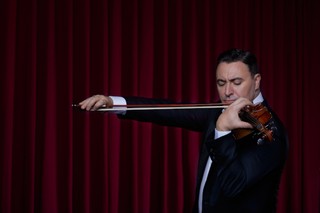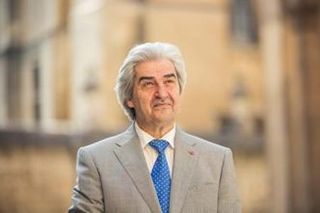|
Back
Two Classics and a Mysterious Third New York
Isaac Stern Auditorium, Carnegie Hall
06/07/2022 -
Max Bruch: Violin Concerto No.1, Op. 26
Pablo de Sarasate: Navarra, Op. 33
Johannes Brahms: Symphony No.1 in C Minor, Op. 68
Maxim Vengerov (Violin)
Students of Pre-College Juilliard School, Oxford Philharmonic Orchestra, Marios Papadopoulos (Conductor) 
M. Vengerov (© IDAGIO/Diago Mariotta Mendez)
“The British may not like music. But they absolutely love the noise it makes.”
Sir Thomas Beecham
Ask scholars, academics, scientists, bibliophiles from any country around the world, “What is the first image that comes to mind after the word ‘Oxford’?”
The answer: Shoes.
Just joking. For the past nine centuries and more, Oxford and Cambridge ruled the world of learning and the Empire of the World. And while this monopoly of learning was surrendered to the red-brick colleges after the Second World War, Oxford is still the touchstone of what is great, revered and noble.
Granted, Oxford never had a music conservatory per se. But Boult and Beecham, Holst and Dowland are among the thousands who graduated from Oxford giving the world what they had learned here. And while Oxford–like Cambridge and Harvard and the Sorbonne–never had a resident orchestra, music here resembles its purpose for ancient Greece and the Medievalists: science, art and mathematics.
The Oxford Philharmonic Orchestra, giving their first New York concert last night, is not officially linked to any Oxford college. Yet since its founding in 1998 by the (still) Music Director Marios Papadopoulos, its short history belies a certain fame in UK and Europe. And recordings with trips through the British Isles and Europe should made the town and colleges of Oxford proud.
Granted, their long-time Music Director is from Cyprus, their Artist-in-Residence is from Russia, and their repertory is more European than English. All three works last night shunned England per se (outside of encore “Nimrod”), yet the Oxford Phil possesses what 18th and 19th Century artists knew: that, whatever the paucity then of great composers, the musicians were the finest.
One expected to see a youthful group of donnish players but they are as middle-aged as any orchestra. And Conductor Papadopoulos has molded them into a stunning group. Granted, they don’t have the singular sounds of older orchestras. In fact, the Oxford Phil has a darker heavier sound at times then its due. Is this because the conductor placed the whole cello section across the front of the stage? Or that, not performing week after week, they don’t quite have that festal joy when necessary?
Their concert last night was bound to enrapture even the most plebeian audience. Max Bruch’s First Violin Concerto is predictable caviar for any fiddler, and Artist-in-Residence Maxim Vengerov didn’t fail. Brahms’ First might have seemed old-fashioned to a revolutionary like Wagner. Yet here, one listened to a work of classical idealism.
Still, the program did have one mysterious entry. Pablo de Sarasate’s Navarra is written for two violins and orchestra. Where on earth was that second fiddler? Conductor Papadopoulos is a pianist. Maxim Vengerov possesses only ten fingers. What was going on?

M. Papadopoulos (© Oxford Symphony Orchestra)
That, actually, was the most enchanting 20 minutes of the concert. Out on the stage came seven young fiddlers from the Pre-College Division of Juilliard. The males were dressed in black. Females wore identical Iberian pinafores. Mr. Vengerov stood like a proud papa, and, after two orchestral bangs, started the sweetest, angelical single work of the evening.
A caveat. Sarasate could compose the most challenging music for any violinist. Navarra was more of a pleasantry, almost what Balliol/Oxford grad Graham Greene would have called “an entertainment.” The underlying rhythms were conservative north Spanish. The melodies were simple charm, And
harmonies between the violins? Unfailingly in beguiling thirds. The results were charming, beguiling anything but cute. Like the duets of Bellini or Rossini, the soloist and orchestra were simply mesmeric.
The Sarasate came after a muscular performance of Bruch. The Concerto has worn well through the centuries. And while one might prefer the more light-hearted, ever-changing Joshua Bell, Maxim Vengerov is equally at home here. One might feel that the intervals between those mighty climaxes were played by rote. Yet when it counted, the violinist showed both a musical affinity with the orchestra and a sinewy execution.
As for the Brahms First Symphony, one wisely eschewed longing for Central European sounds. Mr. Papadopoulos has an orchestra that technically easily essays the piece. And his conducting, neither idiosyncratic or unduly profound, was decent, lovely and an actually memorable classic.
Harry Rolnick
|